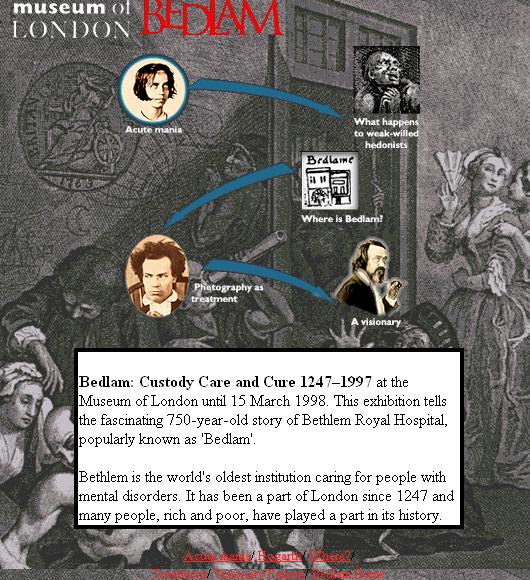|
Survivors History archive of a discussion about Survivor History
that first appeared in Open Mind in
1998 and 1999.
(See place in history). Most of the text also appears on the
Mind website
at link one and
- link two
Reproduced with permission of Peter Beresford and John Hopton - Peter Linnett died 1.9.2007 |
| Open Mind May/June 1998 |

|
Past tensePeter Beresford on the need for a survivor-controlled museum of madness |
| Now is a crucial time in our history to reclaim our past. I am focusing here on two recent events which highlight the paramount importance of recording our side of the story before it becomes too late. The first is the announcement of the sudden death of community care. Since Frank Dobson's reported reversal of policy ('Care in the community is scrapped Daily Telegraph, 19 January 1998), confusion and uncertainty have surrounded future policy. Best guesses point to a reinforcement of failed medical solutions, without adequate financing, as the likely way forward. |

|
For service users, community care has been the most chequered and ambiguous
of policies. The efforts of individual survivors, survivor organisations,
allies and supportive practitioners have meant the winning of some genuine
gains in policy and provision. Rights, involvement and empowerment have
been forced onto the agenda. But, crucially for mental health service
users, community care has been a public relations disaster. Its inadequate
implementation and under-resourcing have set back by a generation both
public perceptions of madness and distress, and how many service users may
see themselves. The most appalling Victorian stereotypes of subhumanity,
dangerousness and axe-wielding murder have been reinforced with all the
power and subtlety of the modern media. It is probably difficult to
overestimate the destructive effects that this has, both for current mental
health service users and for anyone facing madness or mental distress for
the first time.
The rather more specific event which highlights the need for a user-created
history has been the celebration of the
750th anniversary of Bedlam. We
might have expected that a history that from its earliest days reveals a
familiar catalogue of inquiries, scandals, abuse and inhumanity would be
approached with the same sadness and solemnity as any other past inhumanity
or oppression. Instead it has become an opportunity, complete with
commemorative mug, keyring, paper clip and teeshirt, for reinforcing
professional pride and the brand identity of a medical product which by its
users accounts has more to correct than to be proud of. Perhaps most
disturbing of all has been its associated exhibition. This is presented in
classic modernist terms of centuries of progress, culminating in modern
psychiatry and the Maudsley Hospital.
It is made all the worse because it is given the respectability of being
housed in the Museum of London, which generally shows a sensitivity to
issues of difference and discrimination. The current psychiatric orthodoxy
that 'genes contribute to most mental illness' is presented as fact. The
experience of thousands of inmates is reduced to a handful of
indecipherable photographs posed in hospital wards and grounds, and select
biographies of the famous and curious few.
One of these institutions should be preserved as living testimony of the experience of the generations who lived and died within their walls. There have already been some attempts to create institutional museums, for example, at the Stanley Royd Hospital, the old 'West Yorkshire Pauper Lunatic Asylum' and at Calderstones Hospital. But what, crucially, should distinguish this initiative is that it is planned, established and run under the control of psychiatric system survivors and our organisations. Then the possibility of perpetuating professional accounts or becoming another peep show is minimised. It could also build on work that survivors have already done, putting together our accounts in exhibitions, books, news and broadcast media. Such a memorial could collect and house:
It could reflect the different periods in the history of psychiatry, from the insane asylums of the last century, to the chemical-based warehouse psychiatric hospitals of the second half of the twentieth century. It could make a strong case for lottery funding - unusual in being strong on heritage and 'user involvement'!
| Open Mind July/August 1998 |

|
From John Hopton
School of Social Work, University of Manchester As Peter Beresford points out, many existing 'historical' accounts of psychiatry and psychiatric institutions are problematic, based as much on assumptions and professional prejudices as on objective facts. On the other hand, there are some accounts by mental health professionals (such as David Clark's work on Fulbourn) which offer valuable insights into how and why mental health services have developed in particular ways. Thus, Peter Beresford's suggestion that the solution to this problem is for users to develop a competing historical narrative seems misguided. This would simply leave us with two opposing historical accounts with similar methodological flaws and biases. What is required is collaborative historical research, bringing together service users, mental health : professionals and 'neutral' historians : and social scientists. Then, the privileged knowledge of both mental ; health service users and professionals \ may be taken into consideration ; and the contribution which both : groups can make to our historical : understanding may be acknowledged |
From Peter Linnett - London SW17
Peter Beresford is right about 'the need for a survivor-controlled museum of madness'. Yesterday a friend and I toured a development of hundreds of expensive houses and flats on the former site of Tooting Bec psychiatric hospital. When it closed in 1995, the hospital had been there for almost 100 years. Many thousands of people had been patients there. We both used to work there, and wandering the site was a strange experience - not the slightest evidence of the hospital remained. The developer's glossy brochure did mention that this was the site of 'the famous Tooting Bee hospital'. It did not say what kind of hospital. At the very least, Lambeth Healthcare NHS Trust (former owners of the site) should have insisted on a memorial being placed there. The hospital was a grim place, but the people who lived, suffered and died there deserve to be remembered.
| Open Mind September/October 1998 |
Letters
museum of madness
In response to my article about a user-run museum John Hopton said it was misguided for users to develop a competing historical negative. As he must know, the issue is one of inequalities in power, and it is because of this that it is so important for survivors to be able to find a home for our history, just as other oppressed groups have done. As well as much media interest following the article, I have received many letters and enquiries from survivors interested in taking the idea forward. Following one suggestion received I plan to seek initial funding to take the idea forward. If you'd like to be involved please get in touch.
Peter Beresford
Open Services, Tempo House, 15 Falcon Rd,
London SW11 2PJ.
| Open Mind November/December 1999 |
Whose story is it anyway?
Do we need a survivor history of madness?
Peter Beresford and John Hopton develop the radically different views they first expressed in Openmind last year
Dear John
As you know I believe strongly that if we as mental health service users/survivors are to take control of our lives and future, then we must regain control of our past. We have to write our own histories. The history of madness, psychiatry and of us as individuals has so far been dominated and controlled by others; by professionals, charities, politicians and researchers. The effects have been demeaning and destructive for mental health service users. They have harmed the way individuals come to see themselves and how other people see them.
I know you don't share this view, but how can you justify this, given the appalling ways in which mental health service users/survivors have traditionally been presented and their worsening treatment in the media and political debate now? Current discussion is almost entirely preoccupied with service users as dangerous, murderous and threatening. Mental health service users have to change this.
Peter Beresford
Dear Peter
I've not always expressed my views about a user-centred history of mental
health services very clearly in the past, but I have no problem with the
idea of service users/survivors writing their own histories. Indeed, I
would be the first to concede that some terrible things have happened to
people in the name of mental health care and psychiatry. Furthermore some
of the histories of mental health services written by academics and mental
health professionals overlook abuses that have occurred. Worse still, some
of the accounts by mental health professionals are overly sentimental, and
almost make psychiatric hospitals sound as if they are desirable places to
be. In that sense, I think it's vital that service users develop their own
historical accounts. What I have a problem with is the idea of survivors'
histories being presented in one place and 'official' and 'academic'
histories being presented elsewhere.
John Hopton
Dear John
I thought for a moment we were in agreement! But your last comment makes
clear the gulf in understanding that survivors still have to bridge. You
seem to be standing by your original comment which triggered this
discussion that
"for service users to develop a competing historical
narrative seems misguided". The point is that it's not mental
health
service users/survivors who created the need to develop their own
histories, but the 'official' or psychiatric history that has excluded them
for so long. In reality, survivors' own views and accounts of their
experience and perceptions have mainly been ignored and devalued for
centuries. Their history has largely had to be a hidden and private one.
Meantime, psychiatry and its allies established their own powerful
organisations, colleges, journals and texts to perpetuate their versions of
history and of survivors.
History is always written by the winners, and mental health service users
have been cast in the role of losers. Now, as a movement of mental health
service users has developed, the official doors have opened a little. I am
all for collaboration, but this has really only happened because the
user/survivor movement has been able to exert influence and make its
presence felt. And, crucially, survivors have succeeded in getting their
voices heard, establishing their places to express their views and record
their personal and collective histories, where these could be developed on
their own terms, unedited and unqualified. This has led to new ways of
thinking and understanding about madness and distress; about psychiatric
categories like 'schizophrenia' and large-scale social issues like self-
harm and eating distress.
This is something to be proud of, not to regret. It means that there are
now different ways of understanding madness and 'mental illness' and of
addressing them. Writing its own history is one of the ways in which an
oppressed group can challenge what is done to it. All the movements:
women's, black people's, lesbians' and gay men's and disabled people's
movements, have done this. It's another sign of the collective progress
mental health service users/survivors are making.
Dear Peter
While user/survivor histories have indeed been ignored in official
histories of psychiatry and mental health services, I would suggest that
this reflects poor scholarship as much as it may reflect a deliberate
attempt to ignore their side of the story. Much of the history of
psychiatry and mental health services has been written by mental health
professionals who have no formal training in historical research.
Consequently, many such accounts have omissions, contain inaccuracies and
incorporate analysis based on false assumptions.
Such mistakes are easily made when people do not know where to find
appropriate archive material. Unless survivors/users developing historical
accounts are properly qualified historians themselves, or are able to
enlist the help of such people, they will inevitably make similar mistakes.
Indeed, I have read some accounts by survivors/users which are near-perfect
mirror images of some of the worst professional accounts. Whereas some
professional accounts tend to imply that all mental health professionals
are 'saints', some user accounts imply that all mental health professionals
are insensitive and uncaring. I have no wish to hide the fact that there
have been serious abuses committed in the name of mental health care, but I
also want acknowledgement that some professionals have made important
contributions to developing humanistic understandings of and responses to
mental health services. In that sense, it's not the development of
users'/survivors' historical perspectives which worries me. What does worry
me is that the development of separate historical narratives by
users/survivors will lead to a kind of propaganda war between the authors
of 'official histories' and the authors of the user/survivors histories.
This could result in each side selectively focusing on extreme but atypical
examples to score points off each other, so that we get further and further
away from a proper historical understanding of how we got to where we are
now.
What I would like to see is a single archive or museum where oral
testimonies from users/survivors would be side by side with oral
testimonies from mental health professionals, together with various
documentary sources and artifacts. If the testimonies of survivors/users
tell completely different stories from those of mental health
professionals, so be it. But I believe that we will never develop a truly
accurate history of mental health services unless mental health
professionals and survivors/users collaborate with properly qualified
historians.
John Hopton
Dear John
There's barely a word you've written I disagree with - in theory - but in
practice it doesn't work. History isn't neutral or just about expertise and
techniques. It's about who writes and controls it. It's about power,
inequalities of power and conflict. We mustn't deny this. The only
difference between now and the past is that conflicts between psychiatry
and service users are at last coming out into the open. A crucial first
step for us as survivors is to have safe space to develop our own
narratives and history (and survivors will tell of the good as well as the
bad), before our history can be placed next to professional accounts. We
also have much more to offer than 'personal testimony'. We have our own
important analyses and ideas. Yours is not an argument for rejecting
survivors' own history, but for ensuring survivors have more support to
develop it.
Peter Beresford
Dear Peter
My concerns are based on two considerations. Firstly, I have a somewhat
unfashionable belief in the quest for objective truths. Secondly, while I
agree that history is always tied up with issues of power and control,
critical writing on mental health generally (by academics, professionals
and survivors) can be a little one-sided. For example, while many abuses
have been committed in the name of behaviourism, many self-styled critical
thinkers who attack it fail to engage with B.F. Skinner's argument that the
form of behaviourism that he advocated was essentially humanistic.
John Hopton
Dear John
I can't agree with your last point, but what I think we have shown in this
correspondence is that with good will there can be collaboration and this
discussion can be taken forward. Here's hoping it now will be.
Peter Beresford
Andrew Roberts likes to hear from users:
B.F. Skinner is the psychologist most closely associated with behaviour
modification - the rewarding of desirable behaviour and ignoring of
undesirable. Behaviour modification has been attacked for being punitive
and manipulative. However, Skinner argued against the use of punishment,
and that behaviour modification was not manipulative because a client could
shape a therapist's behaviour as much as the therapist could shape theirs.
 Andrew
Roberts home page
Andrew
Roberts home page
 Top of
Page
Top of
Page
To contact him, please
use the Communication
Form

